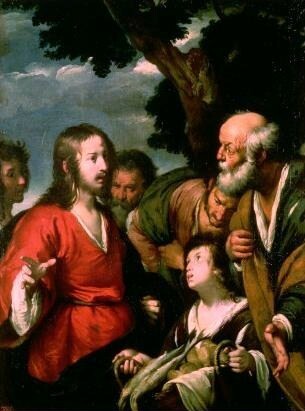©2020 by John LaTorre
There are two stories in the New Testament that tell how Jesus feeds the multitudes by miraculous means. In the first instance, he feeds five thousand people with five loaves of bread and two fishes. In the second instance, he feeds four thousand with seven loaves and two fishes. In each case, there is a lot of food left over.
For those of you who have trouble accepting the veracity of the story, I suggest an alternative more in keeping with the spirit of Christianity that Jesus espoused, a spirit that so many Christians have trouble accepting. It goes like this:
As usual, Jesus and his disciples had attracted a crowd, and he was concerned about how they were going to be fed if they got hungry. Some of his followers suggested that they send the people back to town, but Jesus said that there was enough food already there, so there was no need to send them away.
He knew that most of them were intelligent people, and reasoned that they would have some food of their own on hand, since one shouldn't walk into the desert without bringing enough food to tide them over. They'd already heard that his sermons would often go on for a long time, and they came prepared.
But there are always a few who aren't so intelligent, and it was these people that Jesus was worried about. He asked his disciples how much food they had on hand.
"Well, between us, we've got a few loaves of bread, and a couple of fishes. There's no way we can feed all of them with those."
"I've got an idea," Jesus said. "There are probably a few other people who brought more than they needed. Maybe if you ask them, they'd be willing to share."
So he had his disciples go around and ask each person how much food they had. If they had more than enough for themselves, or knew they could restock their stores back at their villages when they got home, the disciples asked them to turn over what they what they didn't need. That donation went into common baskets, into which the disciples had already put the loaves and fishes they'd brought.
The disciples pointed out that the bread would go stale anyway in another day or two, and the fish would go bad. So it wasn't that big a loss for the donors, and it would be a charitable act that Jesus would certainly approve of. For Jesus had told them plenty of times that selfishness had no place in his philosophy.
On the other hand, if some people truly didn't have enough to eat, the disciple told them to take what they needed from the common baskets.
If you've ever been at a potluck, you know that there's usually more food than anybody could eat, and there would be lots of leftovers. So it was in this case. All the people were fed, and it turned out that there was a lot left over, so much that it filled many baskets. The people were amazed, since they hadn't realized how many people could be fed when everybody shared what they had brought.
So Jesus gave the people a lesson in how, by sharing what they had, they could make the world a better place. Those episodes became garbled in repeated tellings, until they took the form of a divine miracle. And that's a shame, because what would have been a beautiful story about the value of sharing was transformed into a lesson in how you didn't have to worry about going hungry, at least while Jesus was around.
In a world where there's so much food that it rots in the field, yet some people go to bed hungry, it's a miracle that we can perform all by ourselves. Jesus showed us how.
On the other hand, if some people truly didn't have enough to eat, the disciple told them to take what they needed from the common baskets.
If you've ever been at a potluck, you know that there's usually more food than anybody could eat, and there would be lots of leftovers. So it was in this case. All the people were fed, and it turned out that there was a lot left over, so much that it filled many baskets. The people were amazed, since they hadn't realized how many people could be fed when everybody shared what they had brought.
So Jesus gave the people a lesson in how, by sharing what they had, they could make the world a better place. Those episodes became garbled in repeated tellings, until they took the form of a divine miracle. And that's a shame, because what would have been a beautiful story about the value of sharing was transformed into a lesson in how you didn't have to worry about going hungry, at least while Jesus was around.
In a world where there's so much food that it rots in the field, yet some people go to bed hungry, it's a miracle that we can perform all by ourselves. Jesus showed us how.
